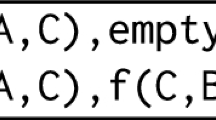Abstract
This paper considers the possibility of designing AI that can learn logical or non-logical inference rules from data. We first provide an abstract framework for learning logics. In this framework, an agent \({{{\mathcal {A}}}}\) provides training examples that consist of formulas S and their logical consequences T. Then a machine \({{{\mathcal {M}}}}\) builds an axiomatic system that makes T a consequence of S. Alternatively, in the absence of an agent \(\mathcal{A}\), a machine \({{{\mathcal {M}}}}\) seeks an unknown logic underlying given data. We next consider the problem of learning logical inference rules by induction. Given a set S of propositional formulas and their logical consequences T, the goal is to find deductive inference rules that produce T from S. We show that an induction algorithm LF1T, which learns logic programs from interpretation transitions, successfully produces deductive inference rules from input data. Finally, we consider the problem of learning non-logical inference rules. We address three case studies for learning abductive inference, frame axioms, and conversational implicature. Each case study uses machine learning techniques together with metalogic programming.



Similar content being viewed by others
Notes
The technique is used for a logic with the law of excluded middle.
The result is shown for normal logic programs and is applied to their subclass of programs.
For simplicity reasons, we omit atoms such as \(hold(r\wedge s)\) in \({{{\mathcal {H}}}}\) that produces non-minimal explanations.
\(\preceq\) coincides with \(\le\) in Sect. 3.1 when rules contain no variable.
An atom A occurring in body(R) is redundant if \(body(R)\setminus \{A\}\equiv body(R)\) where \(\equiv\) is equivalence under subsumption \(\preceq\).
If there is a deduction system that can check whether one rule is derived from other rules, this is done automatically.
Here we assume the existence of a state constraint: \(\forall x\forall y\, [hold(on(x,t))\wedge hold(on(x,y))\supset y=t\,]\) asserting that if an object x is on a table t and x is on y then y is t.
References
Bengio Y, Courville A, Vincent P (2013) Representation learning: a review and new perspectives. IEEE Trans Pattern Anal Mach Intell 35:1798–1828
Bowen KA, Kowalski RA (1983) Amalgamating language and metalanguage in logic programming. In: Clark K, Tarnlund SA (eds) Logic programming. Academic Press, New York, pp 153–172
Bundy A, Sterling L (1988) Meta-level inference: two applications. J Autom Reason 4(1):15–27
Coradeschi S, Loutfi A, Wrede B (2013) A short review of symbol grounding in robotic and intelligent systems. KI Kúnstliche Intelligenz 27:129–136
Grice HP (1975) Logic and conversation. In: Cole P, Morgan J (eds) Syntax and semantics, 3: speech acts. Academic Press, New York, pp 41–58
Hamfelt A, Nilsson JF (1994) Inductive metalogic programming. In: Wrobel S (ed) Proceedings of fourth international workshop on Inductive logic programming (ILP-94). GMD-Studien Nr. 237, Bad Honnef, pp 85–96
Inoue K, Furukawa K, Kobayashi I, Nabeshima H (2010) Discovering rules by meta-level abduction. In: Inductive logic programming, 19th international conference, ILP 2009. LNCS (LNAI), vol 5989. Springer, Heidelberg, pp 49–64
Inoue K, Ribeiro T, Sakama C (2014) Learning from interpretation transition. Mach Learn 94:51–79
Inoue K (2015) Meta-level abduction. IFCoLog J Log Appl 3:7–36
Lenat DB (1979) On automated scientific theory formation: a case study using the AM program. In: Hayes JE, Michie D, Mikulich OI (eds) Machine intelligence 9. Ellis Horwood, Chichester, pp 251–283
Levinson SC (1983) Pragmatics. Cambridge University Press, Cambridge
Martínez D, Alenyà G, Ribeiro T, Inoue K, Torras C (2017) Relational reinforcement learning for planning with exogenous effects. J Mach Learn Res 18:78:1–78:44
McCarthy J, Hayes PJ (1969) Some philosophical problems from the standpoint of artificial intelligence. In: Meltzer B, Michie D (eds) Machine intelligence 4. Edinburgh University Press, Edinburgh, pp 463–502
Michalski RS (1983) A theory and methodology of inductive learning. In: Michalski RS et al (eds) Machine learning: an artificial intelligence approach. Morgan Kaufmann, Palo Alto, pp 83–134
Minker J (ed) (2000) Logic-based artificial intelligence. Kluwer Academic, Norwell
Muggleton SH, Lin D, Pahlavi N, Tamaddoni-Nezhad A (2014) Meta-interpretive learning: application to grammatical inference. Mach Learn 94:25–49
Nienhuys-Cheng S-H, de Wolf R (1997) Foundations of inductive logic programming. LNCS (LNAI), vol 1228. Springer, Heidelberg
Peirce CS (1958) Collected papers of charles sanders peirce, volumes I and II: principles of philosophy and elements of logic. Harvard University Press, Cambridge, MA, USA
Piaget J (1973) Main trends in psychology. Allen & Unwin, London
Plotkin GD (1970) A note on inductive generalization. In: Meltzer B, Michie D (eds) Machine intelligence 5. Edinburgh University Press, Edinburgh, pp 153–63
Prawitz D (2006) Natural deduction: a proof-theoretical study. Dover Publications, New York
Ribeiro T, Inoue K (2015) Learning prime implicant conditions from interpretation transition. In: Inductive logic programming, 24th international conference, ILP 2015. LNCS (LNAI), vol 9046. Springer, Heidelberg, pp 108–125
Sakama C, Inoue K (2016) Abduction, conversational implicature and misleading in human dialogues. Log J IGPL 24:526–541
Sakama C, Inoue K (2015) Can machines learn logics? In: Artificial general intelligence, 8th international conference, AGI 2015. LNCS (LNAI), vol 9205., Springer, Heidelberg, pp 341–351
Sakama C, Ribeiro T, Inoue K (2015) Learning inference by induction. In: Inductive logic programming, 25th international conference, ILP 2015. LNCS (LNAI), vol 9575. Springer, Heidelberg, pp 183–199
Schmidt M, Lipson H (2009) Distilling free-form natural laws from experimental data. Science 324:81–85
Turing AM (1950) Computing machinery and intelligence. Mind 59:433–460
van Emden MH, Kowalski RA (1976) The semantics of predicate logic as a programming language. J ACM 23:733–742
Wong W, Liu W, Bennamoun M (2012) Ontology learning from text: a look back and into the future. ACM Comput Surv 44:20:1–20:36
Woods J, Irvine A, Walton D (2000) Argument: critical thinking, logic and the fallacies. Prentice-Hall, Toronto
Author information
Authors and Affiliations
Corresponding author
Rights and permissions
About this article
Cite this article
Sakama, C., Inoue, K. & Ribeiro, T. Learning Inference Rules from Data. Künstl Intell 33, 267–278 (2019). https://doi.org/10.1007/s13218-019-00597-y
Received:
Accepted:
Published:
Issue Date:
DOI: https://doi.org/10.1007/s13218-019-00597-y




